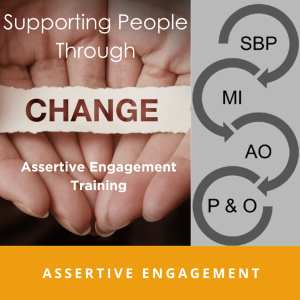Supporting People Through Change: Assertive Engagement

About this Training:
Assertive Engagement (AE) is a model of practice that includes full Motivational Interviewing (MI) training. This is a robust training which, in addition to the full MI On the Fly training, additional knowledge and understanding of the skills of strength-based practice, assertive outreach, and Trauma Informed Care (TIC) are discussed amid the three-tier framework of the Mind Set, Skill Set, and Heart Set of AE. AE allows trainees to build a fulsome set of skills that are geared toward working with marginalized and complex individuals with compassion and understanding but also in a way that reinforces the idea of the possibility and hope of change. MI, which also includes content regarding the understanding and practical use of the Transtheoretical Model of Change (Stages of Change), grew out of the work associated first with addiction support and recovery and has since been established as a best practice related to all aspects of work associated with anyone in a position of considering a change in their lives. MI has been noted as effective in the homeless-serving sector, including assisting those with the highest levels of complex needs. This includes the support of youth. See the link to a video providing additional context. https://invisiblepeople.tv/ken-kraybill-on-motivat…
| Instructor Led (In-person and virtual options) |
|
Training Audience: This training is appropriate for:
Note – The TTA requests that all training include at a minimum, one member of management from each organization/agency represented, be present as a learner. |
|
Training Length: In-Person: Two back-to-back days (15 hrs) |
|
Training Capacity: In-Person: 30 maximum / 8 Minimum |
|
Training Objectives: Attendees will:
|
|
Training Features: In-Person:
Virtual:
Both:
MI On the Fly By Itself: (Go here for more information) |
|
Training Prerequisite Onboarding Modules Mandatory: None |
|
Certificate of Completion Through the TTA LMS, attendees will have the ability to receive a certificate of completion of the training by:
Once the assessment is passed, a link will appear allowing the certificate to be downloaded. |
|
Training Costs Fees listed below include admin costs as well as training preparation and travel time. Travel time is only applicable to In-Person training. Fees listed DO NOT include travel expenses or applicable tax.
Standard (In-Person): $3,600
Members: A system, community, or organization can become a “Member” by purchasing an annual subscription to self-paced online onboarding modules. Discounts on live training are available determined by the subscription package chosen. (See “Onboarding Module” section here) |
The Three “Sets” of AE
Mind Set: This category is about how we think about the people we work with and approach all people as inherently capable, while focusing on their individual strengths and how to identify them, including hidden and cultural strengths.
Skill Set: This section focuses on how we actually do our work with people. We highlight the specific skills essential to best-supporting people as well as adjusting our skills to meet people where they are at including cultural perspectives.
Heart Set: This area refers to how we feel about and how we treat the people we work with. This translates to being able to identify and address our own biases and judgments as well as understanding the impact of the trauma of others and our own.
MI On the Fly Component
MI training with the TTA has been adapted specifically for those working with complex and marginalized individuals, particularly those experiencing homelessness because of the unique nature of the working environment. These practitioners are not working with 50–60-minute planned sessions in an office. Instead, they are supporting people on the street, in parks, in apartments, and possibly under bridges, utilizing very small windows of time and opportunity, often with people that are thinking primarily of survival and trying to manage multiple complexities. Therefore, the TTA MI training (MI On the Fly) provides added context to the use of the skills and adaptations for that type of working environment. Generally, MI also requires those you are working with to have some level of abstract thinking ability. Because many experiencing homelessness, suffer from cognitive and developmental challenges, and because many youths vary in both levels, this training also gives participants some additional understanding and adaptations for using MI in these situations.
